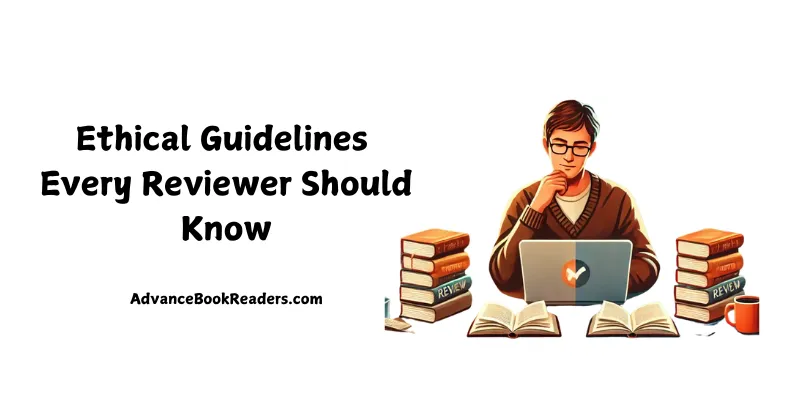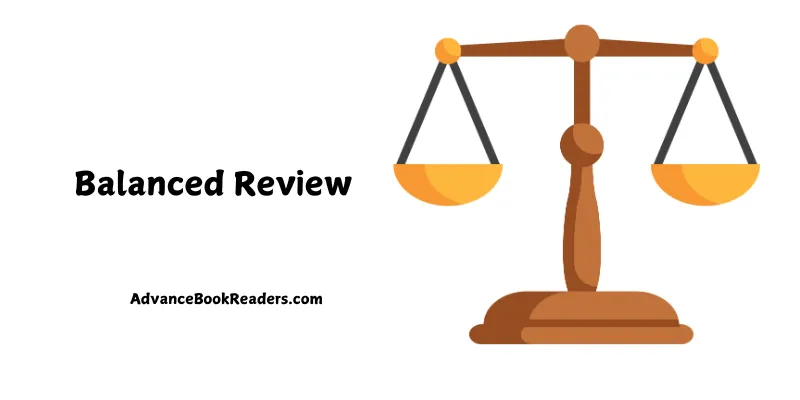Ethical Guidelines Every Advanced Reader Copy (ARC) Reviewer Should Know
Updated: 11 Nov 2024
537
As ARC reviewers, we get to read books before they’re officially released, giving us a unique chance to share our thoughts early. But with this privilege comes a responsibility to be fair, honest, and respectful. Every review we write not only reflects on us as reviewers but also impacts the authors, publishers, and readers who trust our opinions.

This blog will guide you through the ethics of ARC reviewing. Whether you’re a new reviewer or have been reviewing ARCs for a while, these guidelines will help you build trust and credibility.
Let’s dive into the essentials every ARC reviewer should know to keep the process positive and professional!
Understanding the Purpose of ARCs
ARCs, or Advanced Reader Copies, are special versions of books that publishers send out before the official release. The main purpose of ARCs is to gather honest feedback and generate interest in the book before it hits shelves.

As reviewers, we play an important role in helping authors and publishers see how readers might respond to the book. When we receive an ARC, it’s not just a “free book” but an opportunity to support the author’s journey.
By sharing our insights, we help shape the book’s early reception and contribute to its success. Understanding this purpose helps us approach ARC reviews with respect, knowing that our words carry weight.
1. Honesty and Objectivity in Reviews
Honesty and objectivity are essential for ARC reviews. Publishers and authors look to reviewers for genuine feedback, even if it’s not always positive.

Here’s how to keep your reviews fair and respectful:
Importance of Honesty
When you receive an ARC, publishers expect your honest thoughts. They want to know what worked well and what might need improvement.
Honesty builds trust with your readers and helps the book community rely on your opinions. Remember, even if you didn’t enjoy the book, your review still provides valuable insights.
Avoiding Bias
We all have personal tastes and preferences, but in reviews, try to look beyond them. Think about the book’s strengths and weaknesses in a way that other readers might relate to.
Separate your personal likes from the book’s quality—maybe the plot wasn’t your style, but the characters were well-developed. This approach helps you give fair, objective feedback.
Respectful Criticism
Feedback is most helpful when it’s respectful. Instead of saying, “This book was terrible,” focus on specific points, like, “I found the pacing a bit slow, but the character depth was impressive.” This way, your review is constructive and helpful without being overly negative.
2. Transparency and Disclosure
Transparency matters when reviewing ARCs. Your readers should know when a book was provided for free to understand any potential biases.

Here’s how to be open and clear:
Why Disclosure Matters
Being transparent builds trust with your audience. When readers know you received the book as an ARC, they understand your connection to the publisher and can appreciate your review with this in mind. It shows you’re honest about where the book came from and that your opinions are still your own.
How to Disclose an ARC
Adding a simple statement at the start or end of your review works well. Here are a few examples you can use:
- “I received a free ARC in exchange for an honest review.”
- “Thank you to the publisher for providing this ARC copy for review.” A clear disclosure like this keeps things transparent and builds credibility with your readers.
FTC Guidelines (If Applicable)
In some places, like the United States, you’re legally required to disclose any free products, including ARCs. Following these guidelines is essential to avoid any legal issues and shows you take your role seriously as a reviewer.
3. Respecting Embargo Dates
When publishers send ARCs, they often include an embargo date. This is the date before which reviews should not be shared publicly. Respecting these dates is crucial to maintaining good relationships with publishers and authors.
What an Embargo Date Is
An embargo date is the set date when reviewers are first allowed to post their reviews. Publishers use this to coordinate the book’s promotion and release strategy. Sharing a review before this date can disrupt the launch plan.
Why It’s Important to Follow Embargo Dates
Following embargo dates shows respect for the publisher’s schedule. By waiting, you help the book release with the best possible impact. Publishers rely on reviewers to stick to these dates, so breaking an embargo can harm your relationship with them.
How to Plan Around Embargo Dates
To meet embargo dates without stress, try planning your reading and review schedule. Set reminders for each date, and finish reading well in advance. Scheduling your review ensures you respect the embargo while staying organized and consistent.
4. Avoiding Spoilers and Plot Reveals
A major part of an enjoyable review is keeping the story’s surprises intact. Spoilers can ruin the experience for other readers, so it’s essential to handle plot details carefully.
Respecting the Author’s Work
Authors spend months or even years crafting their stories. Revealing too much can take away the excitement they worked so hard to create. By avoiding spoilers, you respect the author’s vision and protect the experience for future readers.
Guidelines on What to Include or Omit
Here are some details to avoid including in a review:
- Major Plot Twists: Keep surprise reveals to yourself.
- Character Fates: Avoid mentioning who lives, dies, or changes dramatically.
- Ending Details: Let readers experience the book’s ending firsthand.
Instead, focus on themes, writing style, and overall impressions to give your readers a sense of the book without giving everything away.
Using Spoiler Warnings
If you need to mention a spoiler, use a spoiler alert at the beginning of that part. For example, write: “Spoiler Alert:” and leave a space before revealing the detail. This way, readers can skip ahead if they want to avoid spoilers.
5. Writing Balanced and Constructive Reviews
A balanced review provides both positives and negatives, offering readers a full view of the book. This approach is fair and builds trust with your audience.

Why Balance Matters
Balanced reviews help readers decide if a book is right for them. Highlighting both the book’s strengths and areas of improvement gives a well-rounded opinion. Even if you didn’t love the book, mentioning its good points makes the review more credible and fair.
Constructive Feedback
Constructive feedback focuses on improving rather than criticizing harshly. Here are some tips:
- Focus on Specifics: Instead of saying, “The story was boring,” try, “The pacing felt slow in the middle, but the ending was rewarding.”
- Point Out Strengths Too: Mentioning what the author did well shows you gave the book a fair chance.
This kind of feedback is helpful for the author and gives readers a balanced view without sounding overly negative.
Avoiding Personal Attacks
Always focus your feedback on the book, not the author. Instead of saying, “The author doesn’t know how to write characters,” say, “The characters felt less developed than I expected.” Personal attacks are unprofessional and can harm your credibility as a reviewer.
6. Privacy and Respect for Author Boundaries
Respecting authors’ boundaries is important when reviewing ARCs. This includes handling personal details, social media interactions, and direct communication professionally.
Respecting the Author’s Privacy
Avoid sharing private details about the author that aren’t relevant to the review. A book review should focus on the story, characters, and writing—not on the author’s personal life or beliefs.
Social Media Etiquette
On social media, it’s best to avoid tagging authors in overly critical reviews. No one likes seeing their work criticized in their feed, especially in a public setting. Save the tags for positive reviews, or simply let your review stand on its own without tagging.
How to Handle Direct Author Interactions
If an author reaches out about your review, stay respectful and professional. Thank them for reaching out, and keep your conversation polite and focused.
| Remember |
|---|
Authors value honest feedback, and a respectful response builds good relationships within the book community. |
7. Recognizing and Disclosing Conflicts of Interest
When reviewing ARCs, being upfront about any connections to the book’s creators is essential for building trust. Conflicts of interest can affect how readers view your review, so it’s important to be transparent.
What Counts as a Conflict of Interest
A conflict of interest exists if you have a personal connection to the author, publisher, or anyone directly involved with the book. For instance, if the author is a friend or if you have a business relationship with the publisher, readers deserve to know. Transparency about these connections shows integrity.
When to Disclose Relationships
It’s a good practice to include a brief note at the start or end of your review if you have any personal connections. Here are some examples:
- “Full disclosure: I know the author personally.”
- “This ARC was provided by a friend who works for the publisher.”
Adding a clear statement like this helps readers understand your perspective and keeps your review credible.
Importance of Remaining Neutral
Even with connections, aim to stay neutral in your review. Avoid letting your relationship influence your opinion. Readers trust reviews that are balanced and unbiased, so make an effort to present your honest perspective fairly.
8. Responsibility for Accurate Information
Accuracy is key when writing ARC reviews. Ensuring that details, quotes, and plot points are correct strengthens your credibility and avoids misunderstandings.
Fact-Checking Basics
Double-check all important information in your review. Ensure the book’s plot, characters, author’s name, and publisher’s details are accurate. Misrepresenting any part of the book can mislead readers, so a quick fact-check can make a big difference.
Using Quotes and Excerpts
Including quotes from the book can add depth to your review. When quoting, make sure you copy the text accurately and, if possible, include page numbers. Accurate quotes show respect for the author’s words and help readers trust your insights.
Correcting Mistakes
If you realize there’s an error in your review, update or correct it. A simple edit shows that you’re committed to accurate information and helps maintain your reputation as a reliable reviewer.
9. The Importance of Professionalism and Consistency
Professionalism and consistency make your reviews more trustworthy. Developing a consistent approach shows readers, publishers, and authors that you take ARC reviewing seriously.
Developing a Consistent Review Process
Creating a checklist for your reviews helps you cover all the essential elements every time. You might include sections for plot summary, strengths, areas of improvement, and your overall impression. This approach keeps your reviews organized and consistent, making them easier to read and understand.
Professional Presentation
Professionalism in reviews includes using correct grammar, spelling, and structure. Proofread your review to catch any errors, and present your thoughts clearly. A well-organized and error-free review is easier for readers to trust and engage with.
Building a Trustworthy Reputation
Consistent, fair reviews help you build a reputation as a dependable reviewer. Readers, publishers, and authors will see you as a credible voice in the book community. This trust can lead to more ARC opportunities and a loyal following of readers who value your insights.
Following these guidelines helps you create ethical, honest, and professional ARC reviews. With transparency, accuracy, and consistency, your reviews become a trusted source for readers looking for genuine book recommendations.
Conclusion
ARC reviewing is a rewarding journey, filled with the joy of discovering new books and sharing insights with other readers. But it also comes with responsibilities. By following ethical guidelines—like being honest, transparent, respectful, and professional—you build trust in the book community and strengthen your credibility as a reviewer.
Remember, each review reflects not only on the book but also on your role as a reviewer. Embracing these principles allows you to provide valuable, unbiased insights to your readers while respecting the hard work of authors and publishers.
As you grow as a reviewer, these practices will help you create balanced, trustworthy reviews that resonate with your audience and support the world of books.
FAQs
Here are some FAQs on the ethical guidelines for reviewing Advanced Reader Copies (ARCs):
What is the main purpose of receiving an ARC?
The primary goal of receiving an ARC is to provide an honest, constructive review that can help readers make informed decisions while offering feedback to the author and publisher before the book’s official release.
Should I disclose that my review is based on an ARC?
Yes, transparency is key in ARC reviews. Always mention that you received an ARC for free in exchange for an honest review. This disclosure builds trust with readers and maintains ethical standards.
Can I sell or redistribute my ARC copy?
No, ARCs are not meant for resale or distribution. They are often unfinished versions and are intended solely for review purposes. Selling or redistributing them violates ethical guidelines and could harm your relationship with publishers.
Is it acceptable to share spoilers in my ARC review?
Avoid spoilers unless specifically requested by the publisher, as ARCs are typically reviewed before most readers have access. If spoilers are necessary for your review, clearly label them as such to respect future readers’ experiences.
How honest should I be in my ARC review?
Always be honest but tactful. Publishers and authors value genuine feedback, whether positive or critical. Offer constructive criticism rather than harsh or personal comments, as this feedback helps improve the final book and supports ethical reviewing practices.
Please Write Your Comments